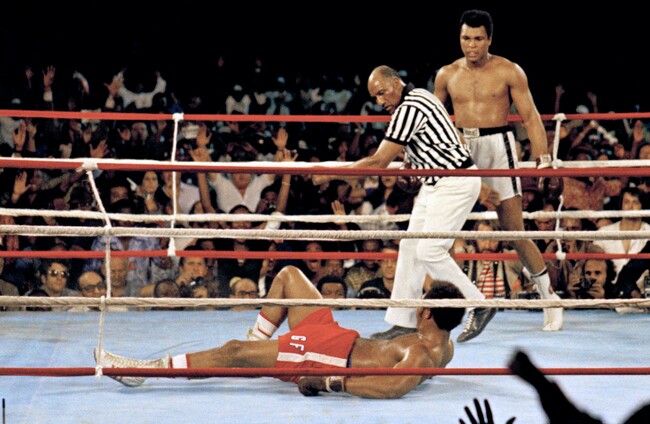Nottingham Forest 1977-79
– BRIAN CLOUGH’S MIRACLE men would seem to be the closest predecessors toLeicester’s title triumph. But where Leicester have billionaire Thai owners, Clough’s Forest once held cheese and wine events to raise funds. Despite that, Clough led them to the Football League championship at the first time of asking with four games to spare, and then two consecutive European Cups, dethroning the all-conquering Liverpool side of Bob Paisley -– the Barcelona of their day — in both competitions. Their record unbeaten run of 42 games (the equivalent of an entire season) stood until Arsenal’s Invincibles in 2004.
Muhammad Ali 1974
– Ali’s refusal to be drafted for the Vietnam War had meant a three-year exile from boxing in what should have been his prime years. On his return he lost to Joe Frazier and Ken Norton, meaning nobody but Ali himself thought he could beat the fearsome George Foreman who had dismantled Norton and Frazier both inside two brutal rounds. But Ali’s “rope-a-dope” tactics in the “Rumble in the Jungle” in Zaire saw him knock out an exhausted Foreman in the eighth round and win back the heavyweight title at the age of 32.
Denmark, Euro ’92
– Given a week’s notice to put a squad together when Yugoslavia were barred from the 1992 European Championships because of civil war, the Danes –- who had been runners-up to the Yugoslavs in qualifying –- were given little hope. A 0-0 draw against England and defeat to hosts Sweden did little to dispel the notion, but a 2-1 win over fancied France put them into the semi-finals and they squeaked past the Netherlands on penalties. The might of world champions Germany awaited in the final but Denmark rode their luck with goalkeeper Peter Schmeichel proving impregnable and goals from John Jensen and Kim Vilfort taking the team that had failed originally to qualify for the tournament to the most unlikely of victories.
Boris Becker, Wimbledon 1985
– When, in June 1985, a fresh-faced 17-year-old from Germany won the grass-court Grand Slam’s traditional warm-up at Queen’s Club in London, he was dubbed a “future Wimbledon champion” by the media. Little did they realise the prediction would come true only three weeks later. Unseeded, and with many of his early matches going largely unnoticed on outside courts, Becker battled to the final where he overcame Kevin Curren. The South African had conquered both Jimmy Connors and John McEnroe in earlier rounds but couldn’t cope with the teenager’s confidence and fearless approach as Becker won the first of his three titles at the All-England club 6-3, 6-7, 7-6, 6-4.
Bob Champion, Grand National 1981
– English jump racing jockey Bob Champion was diagnosed with testicular cancer in 1979 and given between six and eight months to live. But he opted to endure the then new and painful chemotherapy treatment and was remarkably back in the saddle just a year later. He had long believed that Aldaniti had the potential to win the “world’s greatest steeplechase” over the gruelling four-and-a-half miles of Aintree’s famous course, despite the horse being almost constantly being treated for a variety of injuries. Their partnership and victory in the 1981 Grand National was one of pure emotion and inspired the move “Champions” in which John Hurt starred as the jockey. Now 67, Champion continues to work tirelessly to raise money into cancer research.
The42 is on Snapchat! Tap the button below on your phone to add!












You can’t honestly say back to back European cups on a shoestring budget is better than winning the league. Sky won’t have that!
Shoestring budget? Trevor Francis signed for Forest during this time and was the first 1 million pound player in England.
Celtic winning the European Cup in 1967 with 10 players born within 13 miles of Parkhead should be on that list..
And Rangers win in the cup semi final a few weeks ago
Francis wasn’t there when they were promoted or won the league. He signed in 79.
Never knew about some of them stories , pretty impressive from Forrest and the Danes winning the euros is like when Greece won it . With a bit a luck the Irish might cause an upset in the euros
Watch “I believe in miracles” the Forest documentary by BT Sport. It’s great, and a few pearlers from MON in there too
Actually where you say Leicester have a billionaire owner compared to Notts Forest back in 1979. Cloughie broke the transfer record for the 1st £Million Signing Trevor Francis which would be around a £65million signing today.
Francis was signed after forest won the league.
Yes but signed before they won their 2 European cups
Yes but he signed before Forest won their 2 European cups
He played no part in either promotion or the maiden league title. He was the one expensive player in that squad, the rest of it was put together for peanuts.
I would put Tom Brady as one after being the 199th pick to winning four super bowls that is some journey.
Great stories all. But the longest odds shot of them was Denmark at about 150/1.
Aldaniti was only 11/1 – although how horse and jockey got there at all was remarkable.
Puts Leicester’s achievement (5000/1) into context.
Another contender is Shane Lowry who won Irish open as an amateur at odds of about 1000/1.
There were 8 teams and they were 150/1?
So if in 1976 I had put money on Forest to win the league and European cup for the next few years I’d have gotten less than 5000 to 1? I doubt it.
Rocky vs Apollo not mentioned! Crazy stuff
Chris Benoit or Eddie Guerrero Wresertlemania XX
What’s even more impressive about those two Forest European cup wins, was that Clough use to let his players go to Spain the week before each of the finals. They drank the face of themselves and ate what they wanted, he believed they had the hard work done!
I think Denmark weren’t even in my Panini Euro 92 sticker album!
Joe
Denmark did not qualify fro euro 92, however they got in because yugoslavia were kicked out of the competition because of the ongoing war and genocide in the region, Denmark were called up only a week or so before the competition. UEFA had a lot more morals in 1992 than the the current setup which is a by word for corruption.
Ha ha….yeah I know ktsiwot. It said that in the article!! Was just trying to reminisce about my younger days collecting stickers for those albums!!
It has to be Buster Douglas in boxing terms, hopefully Leicester defend there title better though, poor buster looked like he been training at pizza hut,when he defended the title v Holyfield.
Goran Ivonisivic
3 time finalist before he won actually won it as a wildcard
Greece 2004 is pretty impressive too considering. But Leicester winning a tough league is going to stand out in our generation.
Greece would be a great story except for the horrible brand of football they played
Yeah true but if Ireland ever managed to do the same this year would we really care about brand?
We do tend to see our past matches through rose tinted glasses alright
Ali was 3/1 to beat Foreman. Buster Douglas was 42/1 to beat Tyson (and many bookies didn’t even take bets on the fight at the time). If you’re gonna bring fairytale boxing stories into it then it’s gotta be Tyson-Douglas.
What about Cork City holding Bayern Munich at the Cross in 91 ?!
What about it?
Munster beating the all blacks?
Try Munster playing in the Champions Cup next year!
The difference between that Danish team and Leicester is the Danes could play football
Mount Leinster Rangers winning the Leinster Club Final 2014 must’ve been some odds 750/1 at least
Greece winning the Euros or Ivanisivic winning Wimbledon has to be up there as well.